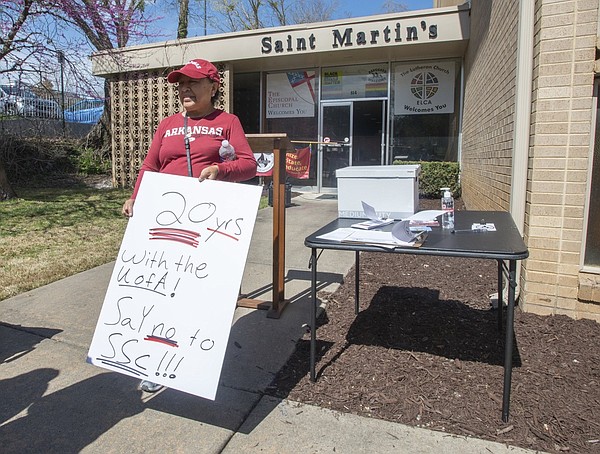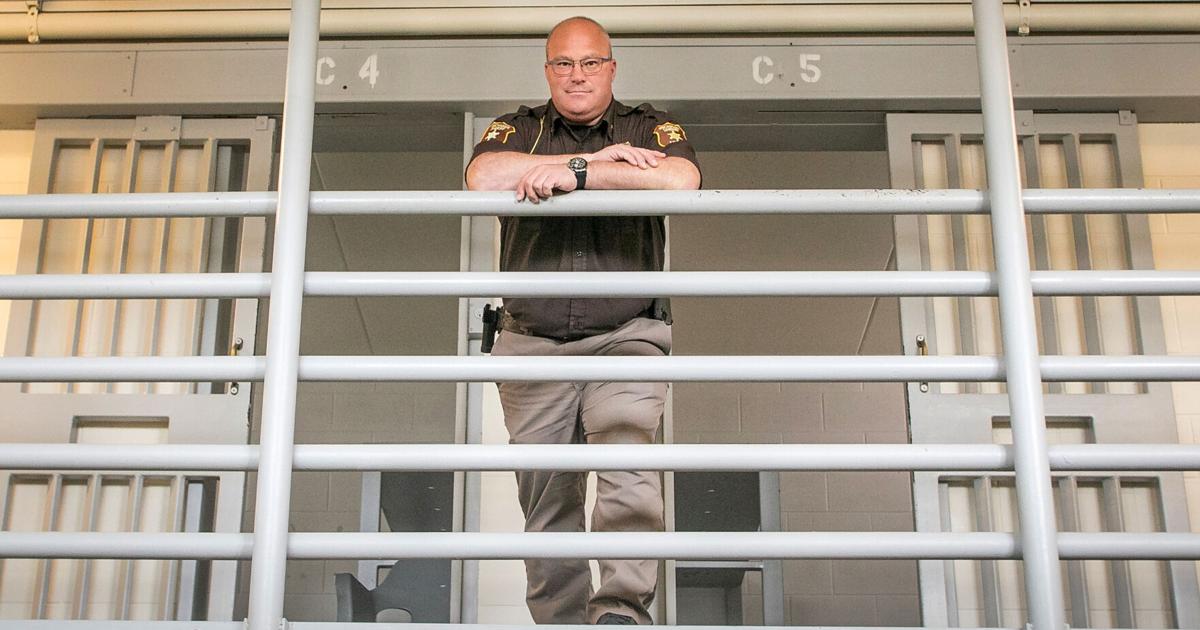University of Arkansas employees protest potential outsourcing of groundskeeping, custodial work | The Arkansas Democrat-Gazette

FAYETTEVILLE — About two dozen demonstrators protested Saturday against the possibility that the University of Arkansas, Fayetteville will outsource grounds and custodial work to a private company.
“This is the most important thing we can do on this day,” said Mike Pierce, a member of the University of Arkansas Education Association, an affiliate of the Arkansas Education Association. “Anyone who tells you outsourcing employees won’t hurt employees is either dumb or thinks you’re dumb.”
Pierce, an associate professor of history at the UA, added that “outsourcing custodial and grounds staff is just the beginning.”
“When the university needed custodians [during the pandemic], custodians came through. … Paying people living wages is good for the university,” he said.
He said more students are applying to the university than ever before, “and that was made possible by the work of custodians” over the past several years.
“Outsourcing and being an ’employer of choice’ cannot exist together,” Pierce said, noting that being an employer of choice is a pillar of the university’s strategic plan.
The Arkansas Education Association “is for every single employee,” said April Reisma, the association’s president.
“We have to stay together to make effective change,” she said. “When we start talking about ‘human capital,’ we stop talking about humans, and that is the problem here.”
Custodians made the campus safe during the pandemic, and they work diligently to do so during inclement weather, because “we take pride in what we do,” said Rebecca Williams, a custodial supervisor who has been with the university for 11 years. “We’re very loyal and dependable, and we’re doing everything we can to make the university look good.”
Custodians “work so hard to keep the university safe and clean” so others can do their jobs for students, and “we just want to keep doing what we’re doing,” said Megan Maples, who works the graveyard shift in the university’s main library. “What we do is really important — I love what I do — and it won’t be the same” if outsourced to a private company, she added.
The group gathered at St. Martin’s Episcopal Center and then marched through campus to the Administration Building, where the demonstration continued. Among those in the audience at St. Martin’s was Fayetteville Mayor Lioneld Jordan, who said he came to “listen” and learn more about the situation.
“Workers need to unify, organize, stand up, and speak up. … Everybody needs to be able to work and feed their family” with their wages, said Jordan, who was a career employee of the university prior to being elected to the City Council in 2000. “I’ve never been a fan of outsourcing.”
The university is assessing its custodial and grounds services as part of a regular evaluation of various campus functions, documenting strengths, potential gaps in service, and areas where consistency and efficiency can potentially be improved, according to Justin Freeman, director of administrative communications in the UA’s Division of Finance and Administration. No decision has been reached, and the university could opt to make no changes, alter some services, or move to partial or full external contracting of grounds and custodial services.
“Right now, we can’t fill all the positions to provide [these] services,” Provost Terry Martin explained during a faculty senate meeting last month. “We get lots of complaints about quality of service, and I understand why — it’s because positions aren’t filled. [This is] not necessarily about saving money, but about the quality of work for the campus.”
It’s “very common” for universities to outsource grounds and custodial departments, and the UA has already been outsourcing a significant portion of the grounds crew because it can’t fill those positions, he said. “We’ve done this before,” as Chartwells and Barnes & Noble handle food services and the bookstore, respectively.
In the last two years, roughly 40% of campus groundskeeping has been handled by two private contractors, with the rest by UA staff, according to the UA-Fayetteville Education Association/Local 965. Chartwells Higher Ed came to campus in 1998, while Barnes & Noble won the bid to privatize operations at the university store in late 2019.
A quorum of the UA-Fayetteville Education Association/Local 965 at its February meeting approved drafting of a resolution to oppose the university turning over the custodial and groundskeeping staffs to a private company.
“Our grounds and custodial employees are vital to the [university], and we know they care deeply about our campus and community,” said Mark Rushing, UA’s associate vice chancellor for university relations. “The ongoing assessment is designed to help us continue to provide these core services to our growing campus consistently and efficiently moving forward. Our responsibility is to make the best decision we can for university operations as a whole, including for our employees, students and visitors.”
If custodial and ground services shift to an external contract, “existing employees can expect a similar working environment to the one they are familiar with now,” according to Freeman. No reductions in staff or salary are expected, benefits will be comparable, and university tuition discounts for existing staff members and/or their spouses and children who are already receiving these discounts will continue.
However, those “terrific tuition discounts” will no longer be offered for those who have not yet enrolled, new custodians and groundskeepers can expect lower salaries, and current employees moved out of the public sector can be fired at will, according to the UA-Fayetteville Education Association/Local 965.
The university staff senate passed a resolution supporting the current workers and cautioning against possible outsourcing Thursday.
“Our primary objective is for all jobs currently considered for outsourcing to remain under the direct employment of” the university, and, should that be infeasible, employees should be offered the chance to remain with the university or transfer to another company, according to the resolution. If retaining all jobs within the university is impossible, the staff senate “strongly advocates for a rigorous request for proposal process to identify the most-qualified vendor, ensuring fairness and ethical standards if outsourcing becomes unavoidable.”
Competitive compensation is a necessity, as is university support for affected employees, according to the resolution. University support includes continuation of tuition benefits for these employees and their dependents, early retirement options, access to mental health support during “the transition,” and “generous severance packages” for those who qualify.
Contracting with SSC Services for Education to study the possibility of privatizing custodial services “is troubling,” as “asking a company that profits from providing custodial services to universities (and might be in line to receive the university contract) to provide an unbiased study about the risks and rewards of privatization suggests that the fix is in,” Pierce said in a recent opinion piece in the Arkansas Democrat-Gazette. “… [B]enefits — both health insurance and pension contributions — will be immediately reduced. The desire for ever-increasing profits will keep wages low moving forward.”
“Perhaps, most importantly, protections against arbitrary firings will be eliminated, and workers with the most experience and the highest wages will be the first to go,” added Pierce. “One must look no further than” the University of Arkansas at Fort Smith — which utilizes SSC for custodial services — “to see that SSC is not an employer of choice. The starting wage for custodians on that campus is 30% less than on the Fayetteville campus.”
With reduced benefits and downward pressure on wages, the custodial staff will again be forced to rely on government assistance programs, according to Pierce. “Arkansas taxpayers will pick up the tab for privatization, and any savings realized by the university will be used to pay the salaries of the ever-growing legion of administrators — vice chancellors, associate vice chancellors, assistant vice chancellors, etc. — many of whom have little to do with the core mission of the university.”



